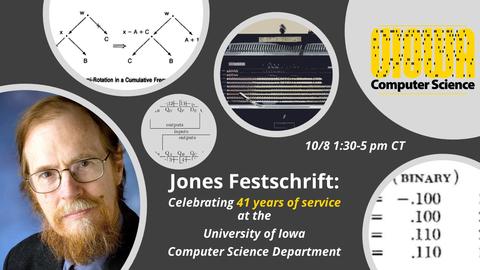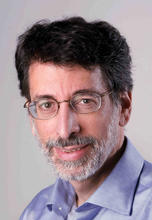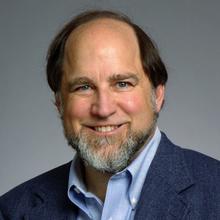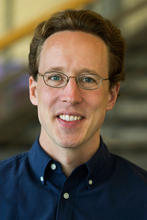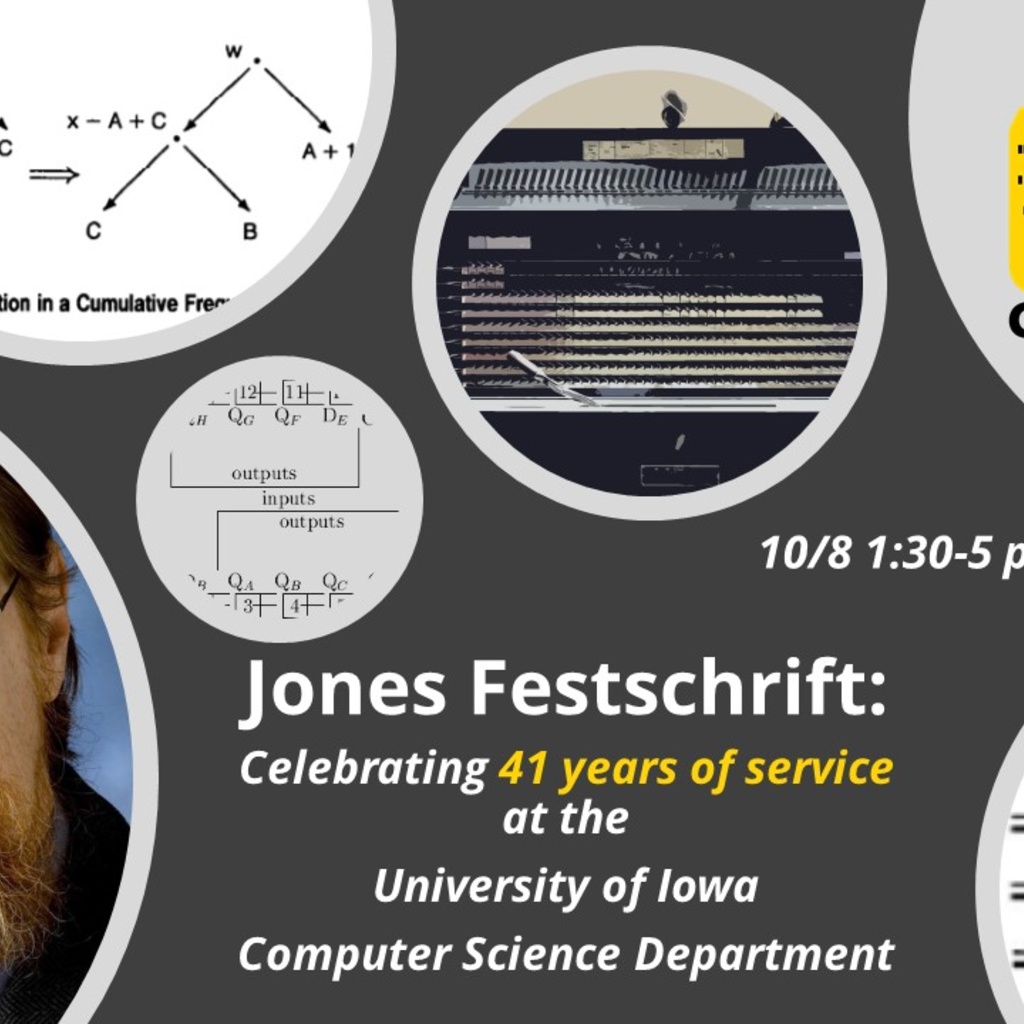
Marking the retirement of Prof. Douglas W. Jones
This event was held on the occasion of Prof. Doug Jones' retirement from the University of Iowa Computer Science Department after 41 years of service.
[Click image below to view event recording]
Notes:
- All times CT [Conversion to your timezone possible here if needed]
1:30-2:10 Andrew Appel: Why academia needs generalists like Doug Jones
Eugene Higgins Professor of Computer Science, Department of Computer Science, Princeton University
Abstract:
I worked with Doug Jones for four summers 1976-1980 when he was a PhD student and I was in a summer job at the University of Illinois before and between years of undergrad. In those years I learned formal computer science from various undergraduate courses, but I also learned a whole lot of computer science from Doug. What I particularly noticed is that he was a generalist: he was interested in everything, and he knew how to make anything. One summer the two of us spent weeks in the machine shop and then programming a single-board computer to make a Braille printer prototype; but he also explained to me interesting new results from the computer science literature. I took a lesson from that: be interested in every part of computer science, and learn how to make things.
Twenty years went by, during which I didn't communicate with Doug--though what he taught me about programming language theory and about compilers had a significant influence on my research interests and my career. Then circa 2003 I (along with many other computer scientists) got interested in voting machines: how they work, where are their vulnerabilities, how should we advise policymakers and citizens about them. And I found that one of the most important resources was the web site and the expertise of Doug Jones, from his "Brief Illustrated History of Voting" to his writings about the failure modes of optical-scan voting machines. Since then Doug has been participating actively in the community of computer-science experts on election systems, where he has written many clear explanations and analyses that have been extremely helpful. What makes him effective in that work, and what I hope makes me effective in my own work in that field, are those qualities he has always had, and I have tried to emulate: be a generalist, be interested in everything, and know how to make anything.
Bio:
Andrew W. Appel is Eugene Higgins Professor of Computer Science at Princeton University, where he has been on the faculty since 1986. He served as Department Chair from 2009-2015. His research is in software verification, computer security, programming languages and compilers, and technology policy. He received his A.B. summa cum laude in physics from Princeton in 1981, and his PhD in computer science from Carnegie Mellon University in 1985. He has been Editor in Chief of ACM Transactions on Programming Languages and Systems and is a Fellow of the ACM (Association for Computing Machinery). He has worked on fast N-body algorithms (1980s), Standard ML of New Jersey (1990s), Foundational Proof-Carrying Code (2000s), and the Verified Software Toolchain (2010s).
2:10-2:50 Ron Rivest, On Election Integrity
Institute Professor, Department of Electrical Engineering and Computer Science, Massachusetts Institute of Technology
Abstract:
This talk provides a brief overview of issues in election integrity, an area of great interest to Doug Jones. We illustrate with discussion of Bayesian election audits, which work with a sample of the cast paper ballots, and estimate the likelihood that the reported winner is correct. Bayesian audits are capable of handling any social choice function (not only the usual plurality, but also approval, instant-runoff (IRV), Schulze method, etc.).
Bio:
Professor Rivest is an MIT Institute Professor. His home department is the Department of Electrical Engineering and Computer Science. He is a member of MIT's Computer Science and Artificial Intelligence Laboratory (CSAIL), a member of the lab's Theory of Computation Group and is a leader of its Cryptography and Information Security Group.
Professor Rivest has current research interests in cryptography, computer and network security, voting systems, and algorithms. In the past he has also worked extensively in the area of machine learning.
Professor Rivest is a co-author (with Professors Cormen, Leiserson, and Stein) of the well-known text Introduction to Algorithms, published by MIT Press. Over 500,000 copies of this text have been sold. It has been translated into 12 languages.
Professor Rivest is an inventor of the RSA public-key cryptosystem. He has extensive experience in cryptographic design and cryptanalysis, and has published numerous papers in these areas. He has served as a Director of the International Association for Cryptologic Research, the organizing body for the Eurocrypt and Crypto conferences, and as a Director of the Financial Cryptography Association. He is a founder of RSA Data Security. (RSA was bought by Security Dynamics; the combined company was renamed to RSA Security, and later purchased by EMC), and is also a co-founder of Verisign and of Peppercoin.
Professor Rivest is a member of the CalTech/MIT Voting Technology Project. He served 2004--2009 on the Technical Guidelines Development Committee (TGDC), advisory to the Election Assistance Commission, developing recommendations for voting system certification standards; he was chair of the TGDC's Computer Security and Transparency Subcommittee. He also serves on the Board of the Verified Voting Foundation. He is a member of a Scantegrity team developing and testing voting systems that are verifiable ``end-to-end.'' He has worked extensively on statistical post-election tabulation audits, of both the ``risk-limiting audit'' and ``Bayesian'' flavors.
Professor Rivest is a member of the Center for Science of Information.
2:50-3:30 J. Alex Halderman, Election Security in the Disinformation Age
Professor of Computer Science & Engineering, University of Michigan | Director, University of Michigan Center for Computer Security and Society
Abstract:
In the wake of the 2020 Presidential contest, election security faces new challenges. Many voters' confidence has been undermined by baseless conspiracy theories. At the same time, other voters have been given false assurance by misleading claims that 2020 was the "most secure election ever." These views make it difficult to discuss the threats that elections actually face, but without further action by Congress and the states, voting will continue to be vulnerable both to real attacks and to false accusations of fraud. To overcome these misconceptions, election security needs, more than ever, to apply Doug Jones's model of public education--direct, pragmatic, thoroughly non-partisan, and encyclopedic in its grasp of the technical facts and historical record. It is essential that voters be accurately informed about real election risks, both to counter disinformation and to ensure that there is public support for badly needed reforms.
Bio:
J. Alex Halderman is Professor of Computer Science & Engineering and Director of the Center for Computer Security and Society at the University of Michigan. His research focuses on computer security and privacy, with an emphasis on problems that broadly affect society and public policy. He has twice testified before congress concerning election security and serves as co-chair of the State of Michigan's Election Security Advisory Commission. In 2019, he was named an Andrew Carnegie Fellow for his work in strengthening election cybersecurity with evidence-based solutions. Last year, he received the University of Michigan President’s Award for National and State Leadership.Professor Halderman is the creator of “Securing Digital Democracy,” a massive, open, online course about the risks and potential of election technology that has attracted tens of thousands of participants worldwide.
3:30-3:40 Break
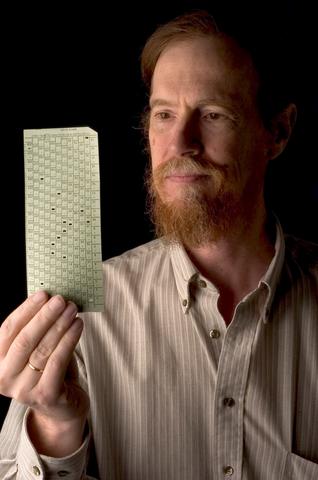 3:40 Douglas W. Jones
3:40 Douglas W. Jones

Associate Professor Emeritus, Department of Computer Science, University of Iowa
Douglas W. Jones is an emeritus computer science faculty member at the University of Iowa, where he has been since 1980. He co-authored “Broken Ballots: Will Your Vote Count?” with Barbara Simons. His involvement with electronic voting began in 1994, when he volunteered to serve on the Iowa Board of Examiners for Voting Machines and Electronic Voting Systems. He chaired the board from 1999 to 2003, and has testified before the US Commission on Civil Rights, the House Committee on Science and the Federal Election Commission. He was a co-principal investigator in the NSF funded multi-institution research center, ACCURATE (A Center for Correct, Usable, Reliable, Auditable, and Transparent Elections), from 2005-2011. Outside the US, he worked as an election observer in Kazakhstan and the Netherlands. Jones was also the technical advisor for the Emmy nominated HBO documentary “Hacking Democracy” released in 2006. More on Jones’ work and press on voting security is available here.
Jones received a B.S. in physics from Carnegie Mellon University in 1973, and an M.S. and Ph.D. in computer science from the University of Illinois at Urbana-Champaign in 1976 and 1980 respectively.
4:00 Prof. Segre remarks and reception

